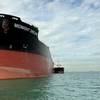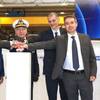University Students, Senior Military Leaders Exchange Ideas
U.S. Navy, Coast Guard, and Marine Corps officers visited Oregon State University (OSU) on Feb. 20 to discuss the nation's new maritime strategy with students and faculty during a "Conversations with the Country" stop. OSU was chosen as one of the discussion locations because of its proximity to Portland, ranked fifth in export tonnage on the West Coast. Capt. Dan Cloyd, Director, Strategic Actions Group, said the Navy was at OSU "to educate and inform the students and hear their concerns regarding the strategy."
The previous Maritime Strategy was written 25 years ago, before many of the students attending the OSU lecture were born. "Conversations with the Country" is a series of discussions across the United States designed to communicate the new Maritime Strategy, "A Cooperative Strategy for 21st Century Seapower." Cloyd began the discussion by outlining the Maritime Strategy for the students, indicating the focus on six core maritime capabilities: forward presence of maritime forces, deterrence, sea control, power projection, maritime security, and humanitarian assistance/disaster response. Cloyd said the maritime security and global system preservation that supports national interests is important to the U.S. and all nations. Instability overseas -- natural or manmade -- affects the nation's ability to move goods and can easily affect our "just-in-time" delivery system.
During the forum's question-and-answer period, Coast Guard Strategic Analyst Lt. Cmdr. John Pruitt expanded on the "just-in-time" concept, explaining that the emphasis on maritime security ultimately benefits every American consumer because 90 percent of the world's commerce is delivered via the sea. "The U.S. operates in a 'just-in-time' economy, meaning we need our goods to arrive in a timely manner because consumers are waiting," Pruitt said. "Without incoming shipments, some stores will run out of goods in a week. [The Navy, Coast Guard, and Marine Corps] all work together to help ensure that process is not interrupted." Students attending the lecture were well-informed and eager to join the discussion with senior leadership. Alissa Irvine, OSU freshman and Navy Reserve Officers Training Corps (NROTC) midshipman, said the presentation helped her understand how the global strategy affects the local economy. "It made me see the importance of shipping because Portland is right on the Columbia River and the ocean," she said. Colby Burns, a sophomore in the NROTC Power to Sea program, said the discussion taught him to think about the Navy's role in maritime security. "I never really thought about the economic aspect of the Navy mission to keep the sea lanes open. [The strategy] added extra importance to know how many people live near the water and the importance to keeping sea lanes safe," he said. Political science professor Kelly Erickson explained to students how truly unique the "Conversations with the Country" forums are. "This type of open discussion about maritime strategy is unprecedented, and your participation in this forum is important for a healthy democracy," he said. With representatives from the Navy, Coast Guard, and Marine Corps at OSU, Erickson said the message made an impression on the students. "Many students are not familiar with the military, and with a forum like this we can discuss in-depth how this [maritime strategy] applies to their lives. "The strategy incorporates fundamentally new components that generate discussion and open dialogue between professors and college students," said Erickson. Vice Adm. John Morgan, Deputy Chief of Naval Operations for Information, Plans and Strategy, agreed. "We're trying to take a world view and ask what can we do to make the world a better place," Morgan said. "Maritime commerce is the foundation of this country. American seapower was vital to the past, but even more important to our future."












